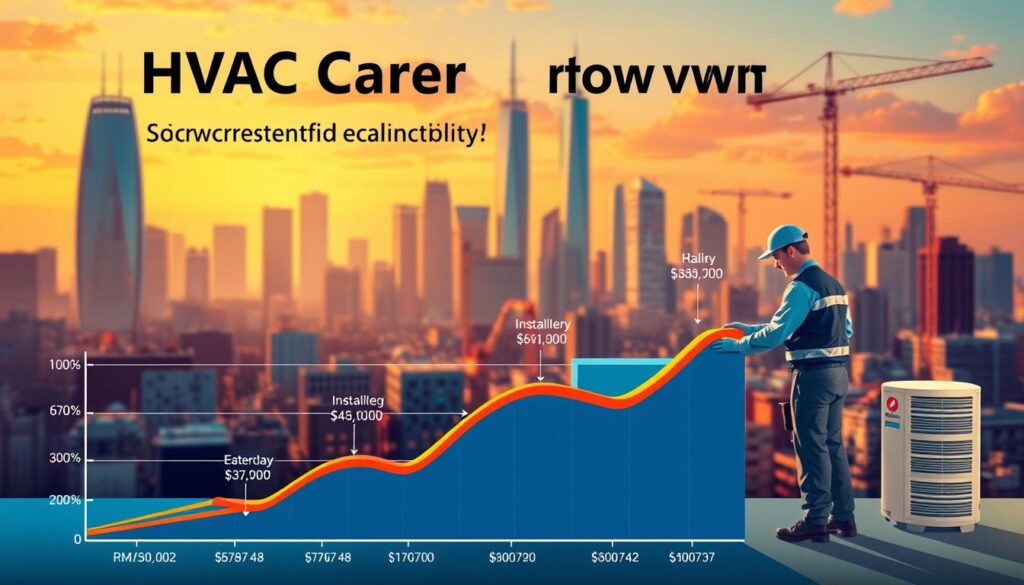Affiliate Disclosure
HVAC Guide Guys is a participant in the Amazon Services LLC Associates Program, an affiliate advertising program designed to provide a means for sites to earn advertising fees by advertising and linking to Amazon.
How Good Is HVAC Career? Are you thinking about an HVAC career? It’s more than just a job. It’s a dynamic path with great growth chances.

Right now, over 650,000 people work in HVAC. The field is growing at 5% each year. This means lots of job openings for those who like working with their hands and solving technical problems.
Exploring an HVAC career means looking at a field with good pay, job security, and many career paths. HVAC workers are key in making our spaces comfortable and working well. They handle everything from home setups to big commercial systems.
Key Takeaways
- HVAC careers offer competitive starting salaries around $49,500 per year
- Potential to earn over $100,000 with advanced skills and experience
- High job stability and low risk of outsourcing
- Diverse career paths within the industry
- Minimal educational requirements to start
- Growing demand across residential and commercial sectors
Table of Contents
Understanding the HVAC Industry and Career Prospects
The HVAC industry is growing fast and full of chances. With new tech and more buildings, your career can grow a lot. You’ll find strong job security and exciting chances in this field.
In 2023, the U.S. had 441,200 HVAC tech jobs. By 2033, this number is expected to grow by 9%. This means lots of new jobs for those starting out.
Current Industry Size and Growth Trends
HVAC trends show big differences in demand across regions. The top states needing HVAC techs are:
- California
- Florida
- Ohio
- Texas
- Illinois
Employment Statistics and Market Demand
| Employment Metric | 2023 Data |
|---|---|
| Total HVAC Technician Jobs | 441,200 |
| Median Annual Salary | $57,300 |
| Average Hourly Wage | $27.55 |
Future Growth Projections
The HVAC sector expects a big increase in workers. The U.S. HVAC industry will need many new workers in the next years. This is because of retirements and the industry’s growth. It’s a great time for skilled people to find a stable and fulfilling job.
“The HVAC industry offers not just a job, but a promising career path with continuous learning and growth opportunities.”
Explore Our HVAC Shop
Looking for top-rated HVAC tools, parts, and accessories? Visit our shop and find the perfect solution for your needs.
Visit the ShopHow Good Is HVAC Career: Exploring Career Benefits
Exploring an HVAC career reveals a field full of opportunities and rewarding experiences. HVAC technicians are key in keeping environments comfortable and solving technical problems.
Let’s look at the benefits that make HVAC jobs very satisfying:
- Competitive Salary
- Strong Job Security
- Flexible Work Schedules
- Continuous Learning
The career offers great financial rewards. In May 2021, HVAC technicians made a median of $50,590 annually. With certifications and specializations, they can earn even more.
“HVAC technicians are the unsung heroes who keep our world comfortable and functional.” – Industry Expert
There are many ways to grow in your HVAC career. You can become:
- Residential Service Specialist
- Commercial HVAC Technician
- Green Technology Expert
- Business Owner
Certification boosts your career. NATE-certified technicians earn 14% more and are happier in their jobs than non-certified ones.
| Career Aspect | Benefit Percentage |
|---|---|
| Job Growth (2021-2031) | 5% |
| Certification Salary Boost | 14% |
| Employment Within 6 Months | 70% |
Your HVAC career is not just a job. It’s a dynamic profession with endless growth opportunities for both personal and professional development.
Educational Requirements and Training Pathways
Starting an HVAC career doesn’t need a college degree. You’ll follow training paths that teach you the skills needed for success in HVAC.
Knowing the right training for HVAC is key for a strong career. We’ll look at the best ways to become a skilled HVAC technician.
Trade School and Vocational Programs
Trade schools have HVAC training that lasts about 9 months. They give you a solid base in technical skills and industry knowledge.
- Comprehensive curriculum covering heating, ventilation, and cooling systems
- Hands-on training with modern HVAC equipment
- Preparation for professional certifications
Apprenticeship Opportunities
Apprenticeships are a great way to grow in HVAC. They mix classroom learning with real-world experience.
| Apprenticeship Details | Key Features |
|---|---|
| Duration | 3-5 years |
| Learning Model | Classroom instruction + On-the-job training |
| Average Starting Wage | 50-60% of journeyman technician rate |
Certification Requirements
Getting certified can boost your HVAC career. Important certifications include:
- EPA Section 608 Certification
- NATE (North American Technician Excellence) Certification
- State-specific licensing credentials
“Continuous learning and certification are the keys to advancing in the HVAC industry.” – HVAC Industry Expert
You’ll need a high school diploma or GED to start. With education, training, and certifications, you’ll have a solid base for a successful HVAC career.
Explore Our HVAC Shop
Looking for top-rated HVAC tools, parts, and accessories? Visit our shop and find the perfect solution for your needs.
Visit the ShopSalary and Income Growth Opportunities

Starting your HVAC career can open up exciting financial doors. New technicians can earn around $37,000, while seasoned pros can make up to $84,000 a year. Your earnings in HVAC depend on several important factors.
Getting to know the different ways to make money in HVAC is key. With the right skills and career moves, you can increase your income a lot.
“In HVAC, your skills directly translate to your earning power” – Industry Expert
Salary Progression by Experience Level
| Experience Level | Annual Salary | Hourly Rate |
|---|---|---|
| Entry-Level | $52,300 | $25.14 |
| Intermediate | $63,500 | $29.00 |
| Senior Technician | $74,500 | $35.82 |
| Supervisory Role | $87,700 | $35.00+ |
Strategic career choices can greatly increase your earnings:
- Get specialized certifications
- Improve your technical skills
- Look into commercial HVAC jobs
- Take advantage of overtime and seasonal work
Getting certified, like with NATE and EPA 608, can raise your salary by 5-10%. Where you work also matters, with places like Alaska and Massachusetts paying more.
Keep learning and improving your skills to grow in your HVAC career. Your hard work and skills will pay off in this rewarding field.
Essential Skills and Qualifications for HVAC Success
To start a successful HVAC career, you need technical skills, personal traits, and specific knowledge. Your success in this field depends on having a wide range of skills. These skills go beyond just basic training.
Understanding the key skills employers look for is the first step in your HVAC career. Mastering these skills will help you stand out in the competitive HVAC job market.
Technical Skills That Matter
- Advanced electrical system understanding
- Comprehensive knowledge of refrigeration principles
- Proficiency in heating and cooling system diagnostics
- Familiarity with modern HVAC software and management systems
- Safe handling of refrigerants and complex equipment
Soft Skills for Professional Success
- Excellent communication abilities
- Strong problem-solving capabilities
- Customer service orientation
- Adaptability in challenging work environments
- Attention to detail and precision
Mathematical and Analytical Prowess
HVAC technicians need strong math skills to do well. Analytical thinking helps you solve complex problems fast and find good solutions.
“Success in HVAC isn’t just about technical knowledge—it’s about applying that knowledge intelligently and efficiently.”
By developing these diverse skills, you’ll be set for long-term success in HVAC. This ensures you have strong job prospects and career growth.
Explore Our HVAC Shop
Looking for top-rated HVAC tools, parts, and accessories? Visit our shop and find the perfect solution for your needs.
Visit the ShopWork Environment and Daily Responsibilities

Your HVAC work environment is always changing. You’ll work in many places, from homes to big industrial sites. You need to be flexible and ready for anything every day.
Every day, you face different tasks:
- Installing heating and cooling systems
- Performing routine maintenance
- Diagnosing equipment problems
- Repairing complex mechanical systems
Being good at your job means solving tough technical problems. You might work in a cool office one day and a hot factory the next. It’s a job that needs both physical strength and quick thinking.
“HVAC technicians are problem solvers who keep the world comfortable and functional.” – Industry Professional
Keeping safe is a big part of your job. You must wear things like respirators, gloves, and safety glasses. Your work hours can change a lot, starting early or late.
| Work Environment Characteristic | Description |
|---|---|
| Physical Demands | High – Requires lifting, climbing, and working in tight spaces |
| Temperature Exposure | Extreme – From freezing to overheated environments |
| Daily Job Variety | Moderate to High – Multiple service calls and diverse tasks |
Your success depends on your technical skills, physical fitness, and quick thinking. The HVAC job tests your ability to be versatile and solve problems in different situations.
Career Advancement and Specialization Options
The HVAC industry is full of opportunities for those who want to grow. There are many paths and specializations to explore. This lets technicians find careers that match their interests and skills.
Exploring the HVAC industry shows many exciting specializations. These options are perfect for ambitious professionals.
Residential vs Commercial HVAC Specializations
HVAC technicians can choose their focus:
- Residential systems need detailed home comfort solutions
- Commercial HVAC requires managing large-scale infrastructure
- Commercial technicians often earn 10-15% more
Green Energy and Sustainable Technologies
New technologies are changing HVAC:
- Solar photovoltaic installers see 105% growth
- Wind turbine technicians will see 96% growth
- Energy auditors will grow 22% in the next decade
Business Ownership Opportunities
Experienced professionals can start their own businesses:
- Starting an independent HVAC business
- About 30% of technicians are self-employed
- Building maintenance contract networks
“The HVAC industry provides diverse career paths for those willing to continuously learn and adapt.” – Industry Expert
| Specialization | Growth Potencial | Average Salary Range |
|---|---|---|
| Residential HVAC | Steady | $45,000 – $55,000 |
| Commercial HVAC | High | $50,000 – $65,000 |
| Green Energy Technician | Rapidly Growing | $55,000 – $75,000 |
Your HVAC career can grow by staying updated on trends. Keep learning and adapt to new technologies.
Explore Our HVAC Shop
Looking for top-rated HVAC tools, parts, and accessories? Visit our shop and find the perfect solution for your needs.
Visit the ShopChallenges and Considerations in HVAC Work
Starting an HVAC career comes with its own set of challenges. The job requires physical strength, technical skills, and mental toughness. HVAC technicians face tough conditions every day that test their abilities.
“Success in HVAC isn’t just about technical knowledge, but about adaptability and perseverance.” – Industry Professional
Some major challenges in HVAC careers include:
- Physically demanding work requiring strength and flexibility
- Exposure to extreme temperatures and challenging work conditions
- Irregular work schedules during peak seasons
- Continuous learning to keep up with technological advancements
There’s more to HVAC challenges than just physical work. Technicians must handle complex technical tasks, manage customer needs, and deal with emergency calls.
| Challenge Category | Key Considerations |
|---|---|
| Physical Demands | Lifting equipment up to 50 pounds, working in confined spaces |
| Safety Risks | High voltage systems, possible exposure to hazardous materials |
| Career Stability | Seasonal income changes, reliance on the construction industry |
Professional tip: Develop strong problem-solving skills and stay physically fit to thrive in this demanding career.
Despite the hurdles, HVAC careers can be very rewarding. The Bureau of Labor Statistics predicts a 15 percent job growth by 2026. This shows a bright future for those who commit to learning and growing professionally.
Job Security and Long-term Career Stability
The HVAC industry is a secure choice in today’s job market. The Bureau of Labor Statistics predicts a 15% growth in the next 8 years. This makes your career prospects very promising. HVAC job security is a bright spot in a changing job world.
So, why is HVAC a secure career? Several important factors make it stable:
- Essential services that cannot be outsourced
- Constant technological innovations driving industry demand
- Critical infrastructure needs in residential and commercial sectors
- Resistance to automation and technological replacement
The HVAC industry is growing strong. Skilled technicians with current certifications and knowledge of smart systems are very valuable. Commercial HVAC systems need special skills, opening up many career paths.
| Career Aspect | Job Security Indicators |
|---|---|
| Growth Projection | 15% increase in next 8 years |
| Training Duration | Certification possible in 40 weeks |
| Career Versatility | Multiple workplace settings available |
| Economic Resilience | Recession-resistant industry |
“In the HVAC world, your skills are always in demand. Technology changes, but the need for comfort and climate control remains constant.” – Industry Expert
Your career can grow beyond entry-level. With ongoing education and certifications from groups like North American Technician Excellence (NATE), you can move into advanced roles. These include system design, engineering, and management.
Conclusion
Exploring an HVAC career shows a promising path with strong job prospects. The HVAC field offers job stability, good pay, and quick entry into a career. It also means less student loan debt.
The industry is expected to grow 15% from 2016 to 2026. This is much faster than the average 7% for other jobs. HVAC technicians can look forward to many job opportunities.
HVAC jobs are also recession-proof. You’ll work in many places like homes, businesses, and factories. This gives you flexibility and chances to keep learning.
You can specialize in different areas like installation, maintenance, or repair. This lets you grow in your career and work in different settings. It’s not just a 9-to-5 job.
Success in HVAC depends on keeping your skills sharp and being open to new tech. It’s a job that requires hard work but offers good pay and overtime. Plus, you’ll feel proud of helping people in different places.
Choosing an HVAC career means more than just a job. It’s a chance for personal and professional growth. Your skills will always be needed, making it a great choice for a fulfilling career.

